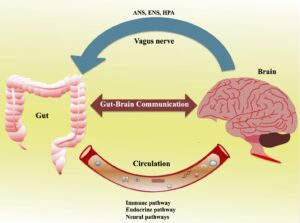
‘Always trust your gut; it knows what your head hasn’t figured out yet.’
An anonymous quote but Hippocrates, the father of modern medicine said 2500 years ago, that all diseases begin in the gut. Gut imbalance is the beginning of disease and ill health.
Are we really aware that our gut contains 100 million neurons within our intestinal walls and forms our Enteric Nervous System ( ENS ) which controls our digestion and sends information throughout our brain, affecting our moods, and instinct as well.
The ENS is two thin layers of more than 100 million nerve cells lining your gastrointestinal tract from the oesophagus to the rectum. The main role of the ENS is to control digestion from swallowing to the release of enzymes that break down food, to the control of blood flow that helps with nutrient absorption to elimination. The ENS doesn’t seem capable of thought as we know it, but it communicates back and forth with our big brain with amazing results.
Hence, we have expressions such as butterflies in my tummy and gut feeling. The Gut is known as our second brain. The gut, unlike the brain, is not capable of thinking. It controls every aspect of digestion and the two brains are connected through the vagus nerve to the brain. The vagus nerve runs from the brain through the face and thorax to the abdomen. These signals can trigger significant emotional shifts in people with digestive problems.
The communication system between the gut and brain is called the gut – brain axis. The gut brain axis refers to the physical and chemical connections between your gut and brain.
Your gut and brain are also connected through chemicals called neurotransmitters. Neurotransmitters produced in the brain control feelings and emotions.
For example, the neurotransmitters serotonin contributes to feelings of happiness and helps control your body clock. Many of these neurotransmitters are produced by gut cells and the trillion of microbes living there. Large amount of serotonin is produced in the gut.
Scientists know that the signals from the genitals are sent to the upper, Central part of the brain just below the crown. Fear is found in the middle of the brain, right between the ears and so on.
Researchers are finding that irritation in the gastrointestinal systems may send signals to the Central Nervous System that trigger mood changes
The new understanding of the ENS – CNS connection helps explain the effectiveness of IBS and bowel disorder treatments, such as anti-depressants and mind therapies like cognitive behavioural therapy and medical hypnotherapy. Our two brains talk to each other, so therapies that help one may help the other.
Gastroenterologists may prescribe certain anti-depressants for IBS because they feel that these medications calm symptoms in some cases, by acting on the nerve cells in the gut.
Your gut – brain axis is also connected through the immune system.
Gut and gut microbes also control inflammation, which is associated with a number of brain disorders like depression, dementia, schizophrenia and Alzheimer’s disease.
Probiotics and prebiotics that affect the brain are also called psychobiotics. Both probiotics and prebiotics have been shown to reduce levels of anxiety, stress and depression.
A few groups of foods are especially beneficial for the gut – brain axis.
These include Omega – 3 fats found in oily fish and also in high quantities in the human brain. Omega – 3’s can increase good bacteria in the gut and reduce risks of brain disorders.
Fermented foods: Yogurt, kanji, kefir, idli, sauerkraut, cheese, pickles all contain healthy microbes such as lactic acid bacteria. Fermented foods have been shown to alter brain activity.
High fiber foods : Whole grains, nuts, seeds, fruits, vegetables all contain prebiotic fibers that are good for your gut bacteria. Prebiotics reduce stress hormones in humans.
Polyphenol rich foods found in cocoa, green tea, olive oil and coffee are plant based chemicals digested by gut bacteria. These increase gut bacteria and improve cognition.
Tryptophan rich foods: Tryptophan is an amino acid that is converted into the neurotransmitter serotonin. Found in turkey, eggs and cheese.
So by altering the type of bacteria in your gut, it may be possible to improve your brain health.
All the best and happy healing from Naturally Dimpi!

